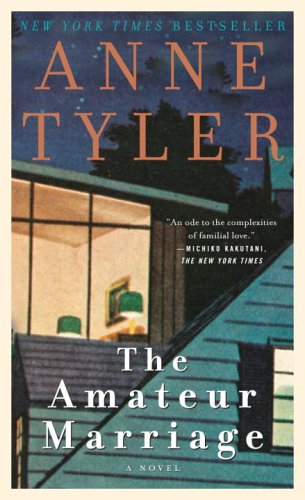All Nonfiction
- Bullying
- Books
- Academic
- Author Interviews
- Celebrity interviews
- College Articles
- College Essays
- Educator of the Year
- Heroes
- Interviews
- Memoir
- Personal Experience
- Sports
- Travel & Culture
All Opinions
- Bullying
- Current Events / Politics
- Discrimination
- Drugs / Alcohol / Smoking
- Entertainment / Celebrities
- Environment
- Love / Relationships
- Movies / Music / TV
- Pop Culture / Trends
- School / College
- Social Issues / Civics
- Spirituality / Religion
- Sports / Hobbies
All Hot Topics
- Bullying
- Community Service
- Environment
- Health
- Letters to the Editor
- Pride & Prejudice
- What Matters
- Back
Summer Guide
- Program Links
- Program Reviews
- Back
College Guide
- College Links
- College Reviews
- College Essays
- College Articles
- Back
The Amateur Marriage by Anne Tyler
Pulitzer Prize winning author Anne Tyler is a master at not simple characterization, but HUMANization. The people she writes about in her many novels could very well be you or me: the teenager obsessed with the songs she hears on the radio, the widow who wonders if she's become the person she was meant to be, the good man who is nevertheless the “black sheep” of his idyllic family.
In “The Amateur Marriage,” her sixteenth book, Tyler tells the story of the decades- spanning marriage of two mismatched people. They are believable characters because they are flawed. They are flawed because each is susceptible to bouts of selfishness. They act this way because they, perhaps, never should have been married in the first place. This, they know, though it takes a long while for either of them to do anything about it.
The couple in question is Michael and Pauline Anton, two attractive people who meet shortly after Pearl Harbor and fall instantly in love— or so they think. To appease Pauline, Michael joins the war. There are warning signs early on that maybe they should have ended their relationship right then and there, but in the throes of new love, they are easily ignored. When Michael returns from the war, he asks Pauline to marry him right away. She does, and again, as if fate were trying to speak directly to their faces, there is a one-last-chance warning sign. But it goes unheeded.
From that point on, Michael and Pauline are stuck together, for better or for worse, just like their wedding vows. Unfortunately, their marriage seems to be more for the worse. Michael accuses Pauline of being too impulsive, too emotional. During their arguments, she is prone to saying deeply hurtful things, and then expecting him to accept her apology minutes later and forget anything ever happened. She runs away a number of times. She openly expresses her worries, her annoyances, her longing for a better life. There are few secrets with Pauline. She wears her feelings on her sleeve. Pauline knows this about herself. In fact, she's probably proud of it. If anything, their marriage “needs some emotion, some heart,” she would say. In her eyes, Michael is forever critiquing her every move, from the inside. She always feels he just barely tolerates her, only he's not strong enough to say it outright. He's too quiet, too stoic, and too levelheaded. Really, Pauline cannot help feeling inferior around him.
In our modern world, we have become bombarded and then jaded with TV shows, dishy novels, “earthy” movies that present us with their cast of “flawed” characters. We all know there's nothing wrong with being flawed (reading about such people often makes us feel better about ourselves), but since when did real people with real problems become so unlikeable?
This is why we need Anne Tyler in the world of fiction. She cares about her people. She loves each of them for all their strengths and weaknesses and that love shines through, even if Michael and Pauline are incapable of expressing it themselves.
It should come as no surprise that midway through the novel, the marriage ends, at least in the legal sense. How this is handled is extremely heartfelt, one of those examples that show how words can express feelings and ideas with a precision movies cannot. The rest of the novel carefully winds through the ins and outs of a divorce, ultimately leaving the reader with an interesting realization: a marriage never really ends. Once two people are joined as one, nothing can truly separate them. Divorce is just another stage of their marriage.
The ending of “The Amateur Marriage” is bittersweet, moving, and so beautifully understated that it could stand as evidence in an argument for the “less is more” way of thinking. It leaves a lasting impression that will surely stick with anyone who goes on this journey with Michael and Pauline. Even the most bitter of readers, scarred by the sharpest, most painful edges of love, will find themselves choking back a tear.
Anne Tyler has said that she never ends a novel without having utter confidence that her people will more or less continue on in the way that she left them. This is good, for it leaves her readers with no reason to wonder, no ambiguity, only the peace and security of knowing. Yet on the surface it appears “The Amateur Marriage” stands alone in the Tyler repertoire. For by the end of “The Amateur Marriage,” who can say for sure whether it was wrong for the Antons to get married? By the end, we don't know if there is a right or wrong.
But then, neither do Michael or Pauline. They too are just a couple of confused newlyweds— amateurs at marriage— still in love, but full of pain. They too are people.
Just like you and me.
Similar Articles
JOIN THE DISCUSSION
This article has 1 comment.
